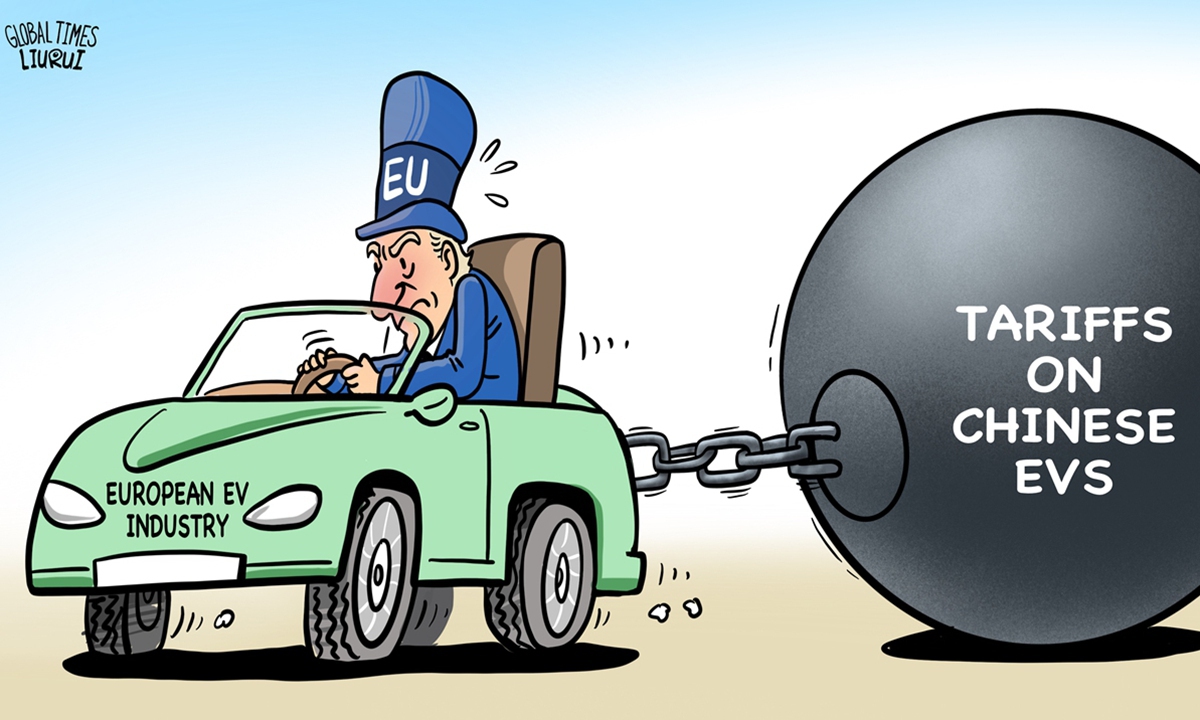
Illustration: Liu Rui/GT
Even to the most casual of observers of European affairs, it must seem obvious that the greatest weakness of the EU's use of tariffs against Chinese electric vehicles is that it is unsupported by the majority of the EU's own members. It is only by an unusual political situation that allowed it to come to the forefront that the proposal to slap heavy taxes on Chinese-made EVs was enabled, and which is now the subject of continuing negotiations between officials in Beijing and Brussels, in the hope of averting escalation.
With the kicking-in of the tariffs, the EU took a step which is understandably unpopular in China.
The trouble for Europe, however, is that the action is also unpopular in much of Europe: across politics and business, it has created a mixture of angst and anger at the damage posed to the interests of the bloc's 27 members.
This act of nefarious self-harm by Brussels is a bureaucracy and legislature blithely acting against the interests of its own people and the industries in which they work.
There are some among the membership, like Spain, who is clear-sighted enough to decline to engage in the groupthink that portrays China as a threat instead of a potential partner, and is opening its doors to China: building a new port terminal and repurposing a former car factory in Barcelona for Chinese EVs, for example.
There are also agreements with Chinese manufacturers to produce electric vehicle plants in Turkey, Hungary and Poland. Europe is split, and it seems the EU, both the Commission and parliament, is out of touch with the members it is supposed to represent.
Five countries - Germany, Hungary, Malta, Slovenia and Slovakia - voted against the proposal to impose tariffs on electric vehicles from China. Only 10 nations voted in favor of the proposal. The remaining 12 countries all abstained. Even though the majority of countries failed to support the proposition, bizarre EU rules allowed the poorly-supported motion to pass.
The regulations governing the weighting of votes meant the opposition required to block the plan would have needed at least 15 states representing 65 percent of the bloc's population to vote against it.
There were also loud voices from the industry most affected by the tariffs, with automobile manufacturers like Volvo, VW and BMW objecting vehemently to the crackdown.
The French newspaper of record, Le Monde, reported the new tariffs as being "a step backward for free global trade and thus for prosperity, job preservation and growth in Europe," quoting the German Association of the Automotive Industry's president Hildegard Mueller.
The electric vehicle model Tavascan, made in China and designed in Spain by Volkswagen's Seat CUPRA brand, would be "wiped out" by the tariffs, according to the company's CEO.
Nevertheless, it passed. So much for Europe's pompously-proclaimed notion of democracy.
In September, Spain's Prime Minister Pedro Sánchez visited Beijing and secured a deal for a joint $1 billion deal for an ecologically-sound hydrogen industrial park. Madrid's economic minister Carlos Cuerpo said at the time: "China is a key economic partner." This is a pragmatic approach to joint partnerships which could be beneficial to both sides and which should be heeded.
EU Commission chief Ursula von der Leyen, on the other hand, had pushed for the tariffs on what she said was a "flood" of subsidized EVs from China, which she believes is distorting European market.
A study by the Institute for European Policymaking at Italy's Bocconi University said the new tariffs - imposed at the behest of the Commission having acted without receiving any complaint from industry - risk derailing the EU's Green Deal, the raft of policies which aim to achieve climate neutrality within the union by 2050: raising consumer prices and threatening exports without any real evidence to back it up.
What does it say about the EU when countries like Spain opens its doors to China while at the same time the European Commission is trying to slam them shut?
It says Europe's approach to China is dysfunctional and needs a reality check.
The author is a journalist and lecturer in Britain. opinion@globaltimes.com.cn




